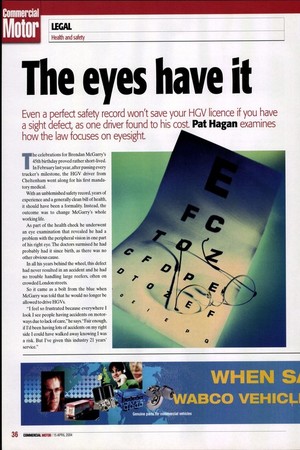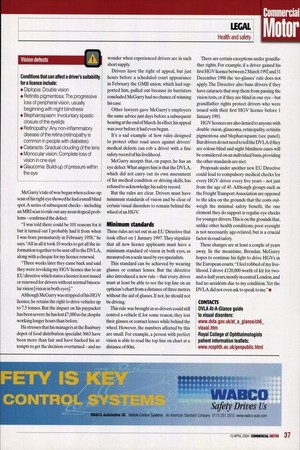The eyes have it Even a perfect safety record won't
Page 34

Page 35

If you've noticed an error in this article please click here to report it so we can fix it.
save your HGV licence if you have a sight defect, as one driver found to his cost. Pat Hagan examines
how the law focuses on eyesight.
The celebrations for Brendan McGarry's 45th birthday proved rather short-lived. In February last year, after passing every trucker's milestone, the HGV driver from Cheltenham went along for his first mandatory medical.
With an unblemished safety record, years of experience and a generally clean bill of health, it should have been a formality. Instead, the outcome was to change McGarry's whole working life.
As part of the health check he underwent an eye examination that revealed he had a problem with the peripheral vision in one part of his right eye. The doctors surmised he had probably had it since birth, as there was no other obvious cause.
In all his years behind the wheel, this defect had never resulted in an accident and he had no trouble handling large reefers, often on crowded London streets.
So it came as a bolt from the blue when McGarry was told that he would no longer be allowed to drive HGVs.
"I feel so frustrated because everywhere I look I see people having accidents on motorways due to lack of care," he says. "Fair enough, if I'd been having lots of accidents on my right side I could have walked away knowing I was a risk. But I've given this industry 21 years' service."
McGarry's tale of woe began when a close-up scan of his right eye showed he had a small blind spot. A series of subsequent checks — including an MRI scan to rule out any neurological problems —confirmed the defect.
"I was told there could be 101 reasons for it but it turned out I probably had it from when I was born prematurely in February 1958," he says. "All in all it took 10 weeks to get all the information together to be sent off to the DVLA, along with a cheque for my licence renewal.
"Three weeks later they came back and said they were revoking my HGV licence due to an EU directive which states a licence is not issued or renewed for drivers without normal binocular vision [vision in both eyes]."
Although McGarry was stripped of his HGV licence, he retains the right to drive vehicles up to 7.5 tonnes. But the impact on his paypacket has been severe: he has lost £7,000 so far, despite working longer hours than before. He stresses that his managers at the Banbury depot of food distribution specialist 3663 have been more than fair and have backed his attempts to get the decision overturned — and no
wonder when experienced drivers are in such short supply.
Drivers have the right of appeal, but just hours before a scheduled court appearance in February the GMB union, which had supported him, pulled out because its barristers concluded McGarry had no chance of winning his case.
Other lawyers gave McGarry's employers the same advice just days before a subsequent hearing at the end of March. In effect, his appeal was over before it had even begun.
It's a sad example of how rules designed to protect other road users against drivers' medical defects can rob a driver with a fine safety record of his livelihood.
McGarry accepts that, on paper, he has an eye defect. What angers him is that the DVLA, which did not carry out its own assessment of his medical condition or driving skills, has refused to acknowledge his safety record.
But the rules are clear. Drivers must have minimum standards of vision and be clear of certailivisual disorders to remain behind the wheel of an HGV. Minimum standards
These rules are set out in an EU Directive that took effect on 1 January 1997. They stipulate that all new licence applicants must have a minimum standard of vision in both eyes, as measured on a scale used by eye specialists.
This standard can be achieved by wearing g,lasses or contact lenses. But the directive also introduced a new rule — that every driver must at least be able to see the top line on an optician's chart from a distance of three metres without the aid of glasses. If not, he should not be driving.
This rule was brought in so drivers could still control a vehicle if for some reason, they lost their glasses or contact lenses while behind the wheel. However, the numbers affected by this are small. For example, a person with perfect vision is able to read the top line on chart at a distance of 60m.
There are certain exceptions under grandfather rights. For example, if a driver gained his first HGV licence between 2 March 1992 and 31 December 1996 the 'no-glasses' rule does not apply. The Directive also bans drivers if they have cataracts that stop them from passing the vision tests, or if they are blind in one eye — but grandfather rights protect drivers who were issued with their first HGV licence before 1 January 1991.
HGV licences are also denied to anyone with double vision, glaucoma, retinopathy, retinitis pigmentosa and blepharospasm (see panel). But drivers do not need to tell the DVLA if they are colour-blind and night blindness cases will be considered on an individual basis, providing the other standards are met.
Proposals under another new EU Directive could lead to compulsory medical checks for every HGV driver every five years — not just from the age of 45. Although groups such as the Freight Transport Association are opposed to the idea on the grounds that the costs outweigh the minimal safety benefit, the one element they do support is regular eye checks for younger drivers.This is on the grounds that, unlike other health conditions, poor eyesight is not necessarily age-related, but is a crucial factor in road safety. These changes are at least a couple of years away. In the meantime, Brendan McGarry hopes to continue his fight to drive HGVs in the European courts: "I feel robbed of my livelihood. I drove £120,000 worth of kit for twoand-a-half years, mostly in central London, and had no accidents due to my condition. Yet the DVLA did not even ask to speak to me." • Vision defects Conditions that can affect a driver's suitability for a licence include: • Diplopia: Double vision • Retinitis pigmentosa: The progressive loss of peripheral vision, usually beginning with night blindness • Blepharospasm: Involuntary spastic closure of the eyelids • Retinopathy: Any non-inflammatory disease of the retina (retinopathy is common in people with diabetes) • Cataracts: Gradual clouding of the lens • Monocular vision: Complete loss of vision in one eye • Glaucoma: Build-up of pressure within the eye CONTACTS DVLA At-A-Glance guide to visual disorders: WWW dvla.gov.uk/at_a_glance/ch6_ visual.htm Royal College of Ophthalmologists patient information leaflets: www.rcophth.ac.uk/genpublic.html
























































































































































































